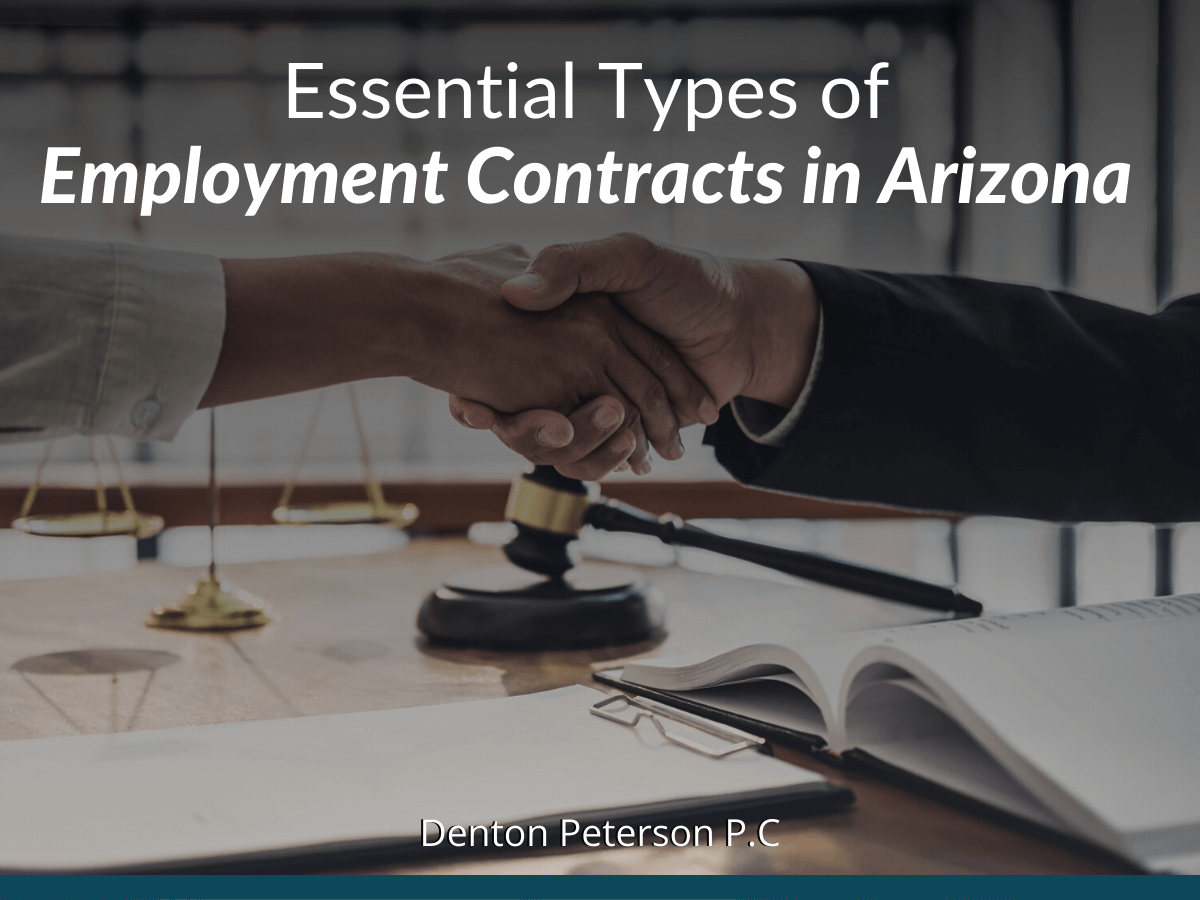Essential Types of Employment Contracts in Arizona
Employment contracts can be useful tools to define the relationship between you and your employees – as well as some of the expectations for employment, such as duration and compensation. But there is no one-size-fits-all employment contract. The type of contract you need will depend on numerous factors, including the type of business you run, what type of employment relationship you want, and more.
The best thing you can do is work with a Gilbert employment lawyer to think through your employment issues and to get advice on the best type of contracts to have and then to have drafts ready. Here are a few types of essential employment contracts in Arizona your lawyer is likely to tell you about:

Permanent
Permanent employment contracts are among the most common, and they are usually implied in situations where employees are hired but a formal contract is not signed. Permanent contracts are for employees who work regular hours and are paid an hourly rate or a salary. There is no end date attached to these contracts – they are terminated when the employee resigns or is fired or laid off.
Employees who have permanent contracts have the full range of rights under the law. However, it is important to remember that even if you are a “permanent” employee, your relationship with your employer is likely to be “at-will,” meaning that the employer or employee can end the relationship at any time. In Arizona, unless there is an enforceable written agreement to the contrary, the assumption is that all employment relationships are “at will.”
Fixed-Term
Fixed-term employment contracts are given to those who are only expected to work for a specific period of time, such as one year. These contracts can be awarded with the understanding that employment will end at that time or that a new contract can be signed and the term of employment renewed.
Employers usually offer fixed-term contracts if they want to have more leverage in letting go of employees without risk, or they use these contracts to cover short-term demand, such as when a new project increases workload or when an employee is going to be gone for maternity or other leave.
Fixed-term contracts are typically in place for a certain amount of time before the employee is brought into permanent status. However, that is not required, and laws on this vary by jurisdiction.
Casual
Casual employment contracts are designed for employees who will work erratically, typically based on need. They might work different hours from week to week, or they might have gaps in their schedules. The understanding in these contracts is that the working schedule and hours will fluctuate.
Employees with these kinds of contracts will be able to acquire certain benefits under the law if they work a certain number of hours. You’ll need to discuss the specifics for this kind of employment relationship with your Scottsdale employment attorney carefully so that you know exactly how the law applies to your situation.
Consultant Agreement
Not all employment is expected to last. You might hire a freelancer or consultant to work with you on a specific project or to work with you on an ongoing basis as needed. A consultancy agreement lays out the terms of your working relationship. Often it can stipulate that the consultant is not an employee at all, but rather an independent contractor of the company. In such cases it is possible—usually advisable, in fact—to include certain requirements, such as confidentiality, non-solicitation, or non-competition.
Having an employment contract (or an independent contractor agreement) with each of the people who work at your company can be a good way to clarify the working relationship and to protect your company against risk. Employment contracts and independent contractor agreements make it less likely that there will be any confusion in the relationship between the parties, and help avoid things such as to employees suing you over things like paid holidays or termination. We highly recommend that you talk through the specifics in detail with your employment attorney in Gilbert so you can include information about all possible scenarios. The more detailed your contracts, the less likely you will be to find yourself on the wrong end of a lawsuit.
The employment attorneys at Denton Peterson are ready to help you put together the employment contracts your business needs to protect you from potential disputes. We can draft up new contracts, or we can review and revise the contracts you are currently using. We also represent businesses that are currently involved in employment disputes, as well as other litigation. Our experienced Phoenix business attorneys can negotiate or litigate on your behalf to protect your business and minimize your liability. They also draft and review all types of contracts. Contact us in Arizona to talk with one of our dedicated employment lawyers about your needs.

Brad Denton – Denton Peterson, PC
1930 N Arboleda #200
Mesa, AZ 85213
Office: 480-325-9900
Email: [email protected]
Website: https://arizonabusinesslawyeraz.com